
Radon Awareness Month – Radon Awareness Week (January 23 – 27, 2024)
Key Facts
- Radon is the second leading cause of lung cancer after cigarette smoking.
- The EPA and the Surgeon General’s office estimate radon is responsible for more than 21,000 lung cancer deaths each year in the United States.
- Testing your home is the only way to know if radon levels are high. You and your family could be at risk for lung cancer from radon.
January is Radon Awareness Month and Radon Awareness Week. The aim of National Radon Action Month is to increase the public’s awareness of radon, promote radon testing and mitigation, and advance the use of radon-resistant new construction practices.
Radon is a radioactive gas that is naturally released in the air from rocks and soil. It can be found in the air outside and can get inside buildings and homes, where it can build up. There is no known safe level of radon. Aiming for the lowest radon level you can achieve in your home will reduce your risk of harmful health effects, including lung cancer.
According to the U.S Environmental Protection Agency, here are five things you can do during National Radon Action Month:
- Test your home – EPA and the U.S. Surgeon General recommend that all homes in the U.S. be tested for radon. Testing is easy and inexpensive.
- Attend a National Radon Action Month event in your area – Look for radon events in your community.
- Spread the word.
- Spend time during National Radon Action Month encouraging others to learn about radon and test their homes.
- Tell your family and friends about the health risk of radon. Encourage them to test their homes.
- Buy or build a radon-resistant home – Read more about radon-resistant new construction, “Building Radon Out: A Step-by-Step Guide to Build Radon-Resistant Homes” (PDF).
In Michigan, nearly one in four homes is expected to exceed the recommended federal action level and, in some counties, as many as 40-45% of homes could be affected. Because of this, DHD#10 is working to educate the public about the importance of testing their homes and building for radon exposure. Testing should occur in all homes, whether new or old, every two years. The only way to know for sure if a home has a buildup of radon is to test for it.
For more information on radon or radon testing, please visit www.epa.gov/radon. You can also call 888-217-3904 to connect with your local DHD#10 Environmental Health office.
Quick Links:
CDC | Radon
U.S Environmental Protection Agency | National Radon Action Month
MDHHS | Michigan Indoor Radon Program
